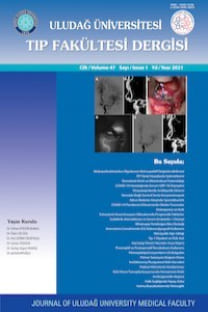Subdural Ampiyemlerin 20 Yıllık Retrospektif Analizi
İntrakranial subdural ampiyem potansiyel yıkıcı komplikasyonlarla giden bir nöroşirürji acilidir. Erken tanı, erken cerrahi ve uygun antibiyotik tedavisi mortaliteyi azaltır. Bu makalede 1990-2009 yılları arasında opere edilen 31 hasta retrospektif olarak incelenmiş ve klinik prezentasyon, etyolojik faktörler ve tedavi stratejileri açısından karşılaştırılmıştır. En sık etken Stafilococcus aureus idi. En sık başvuru şikayeti ateşti ve tanı tüm olgularda konrastlı kranial BT ile konuldu. En sık yerleşim yeri frontal konveksite idi. Kraniotomi 24 olguya, sadece burr-hole 4 olguya, hem burr-hole hem kraniotomi 3 olguya uygulandı. Ortalama takip süresi 20 (±23.25) ay idi. 4 hastada rekürrens izlendi. Agresif tedaviye rağmen mortalite ve morbiditenin hala yüksek olduğu akıldan çıkarılmamalıdır. Kraniotomi ile ampiyem boşaltılması önerdiğimiz tedavi şeklidir.
Anahtar Kelimeler:
Cerrahi tedavi, Burr hole, Kraniotomi, Subdural ampiyem
20-Years Retrospective Analysis of Subdural Empyemas
Intracranial subdural empyema is a neurosurgical emergency with potentially devastating complications. Early diagnosis, early surgery and appropriate antibiotic treatment decreases the mortality. In this article, 31 patients have been examined retrospectively and compared by clinical presentation, ethiologic factors and treatment strategies. The most frequent ethiological agent was Staphilococcus aureus. Fever was the most common clinical presentation and cranial CT with contrast enhancement was used for diagnosis in all patients. In 24 cases craniotomy was performed while burr hole evacuation was performed in 4 cases. Both burr hole and craniotomy were performed at 3 cases. The mean follow up time was 20 (±23.25) months and recurrens was detected in 4 cases. Early diagnosis and quick surgery affects the prognosis significantly. Despite the aggressive treatment it has to be kept in mind that mortality and morbidity is still too high. Excretion of the empyema by craniotomy is the procedure that we suggest.
Keywords:
Surgical treatment, Burr hole, Craniotomy, Subdural empyema,
- ISSN: 1300-414X
- Başlangıç: 1975
- Yayıncı: Seyhan Miğal
Sayıdaki Diğer Makaleler
Vertebral Kemik İliği T2 Relaksasyon Zamanının Osteoporozda Tanı Değeri
Gökhan GÖKALP, Fatma Şentürk MUTLU, Hakan CEBECİ, Ayşe Kalyoncu UÇAR, Zeynep YAZICI, Deniz SIĞIRLI
Sinovyal Sarkom Olgularımızın Genel Özellikleri
Bahar ELEZOĞLU, Naile AŞIK, Mehtap Kasap KILIÇOĞLU, Ulviye YALÇINKAYA
Subdural Ampiyemlerin 20 Yıllık Retrospektif Analizi
Tolga KAPLAN, Turgut KUYTU, Mevlüt Özgür TAŞKAPILIOĞLU, Hasan KOCAELİ, Ender KORFALI, Ahmet BEKAR
Alkol İle İlgili Adli Tıp Sorunları
İntravenöz Parasetamolün Torakoskopik Cerrahi Sonrası Postoperatif Analjezi Üzerine Etkinliği
Vildan Alev ÇINAR, Fatma Nur KAYA, Belgin YAVAŞCAOĞLU, Suna GÖREN, Sami BAYRAM, Elif BAŞAĞAN-MOĞOL, Atila KAYA
